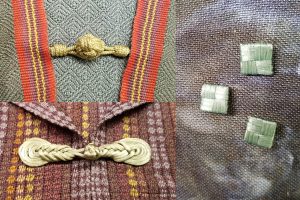- Home
- Art Camp Teachers and Classes
Art Camp Teachers and Classes
Download the Art Camp Booklet with all information at
- Included with your registration is your choice of ONE of these 2-day Workshops
- 12 hours of instruction on Saturday and Sunday with time to work independently Monday morning
Beginning Tapestry Weaving

Sherri Woodard Coffey
Class Size: 10
Loom: warped tapestry, floor or table loom
Class Materials Fee : $30.00, possibly less
Skill level: Some knowledge of weaving, using a loom, which will be warped in advance
Workshop Description:
Topics we will cover are beginning the tapestry with twining and/or soumak, how to blend colors with hatching and gradations, finishing techniques to protect both the warp and weft, display techniques and design methods. Depending on time we will also cover using a cartoon, spots, pick and pick and eccentric wefts
The picture is of Sherri’s work, Sine Wave, woven in her hand-dyed wool yarns, and 34″ x 61.75″. You can see more of Sherri’s work at https://sherriwoodardcoffey.com/
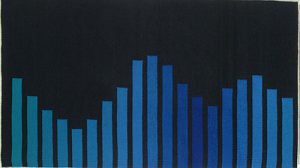
Instructor will provide:
- Handouts, long tapestry needle, graph paper, and hand-dyed wool yarns. These yarns are 2-ply @ 1040 ypp.
- With a sett of 6 epi, I use 2-3 strands together. With a sett of 8 epi, I use 1 or 2 strands together. Finer yarns will, of course, weave differently
Materials needed
- Note taking materials, if desired (there will be handouts)
- Floor loom, warped and ready to go (instructions will be sent) OR frame loom*
- Your usual weaving tools, such as scissors, small ruler, tape measure, etc
- Optional: temple, task light, experimental wool yarns, sketch book, colored pencils We will have a warp of 12 inches, sett of either 6 or 8 epi.
I recommend the Bockens cotton rug warp from Lone Star Loom Room either white or natural. The 12/9 can be used at either a sett of 6 or 8, but some tapestry weavers prefer the 12/6. (See note above about the yarn which will be provided.)
Deflected Doubleweave

Deborah Harrison
Class Size: 10 (max 12)
Loom: Warped loom with a minimum of 8 shafts
Class Materials Fee: $10
Skill Level: Intermediate
It’s easy to get enthusiastic about this special form of doubleweave—for its versatile design capacity (lots of blocks on relatively few shafts), its potential for creating dimension and texture (if you shrink one weave, the other one puffs), and its delightful ability to transcend the vertical and horizontal grid of most loom-produced cloth.
In this on-loom class, participants will choose a draft from those provided, choose their fiber, and then weave samples in structures that allow the warp and weft to shift away from parallel and perpendicular elements and move toward an array of curves, undulations, and textures.
This is not a round robin class, but you will be enticed by the variety of drafts chosen by the other participants. The class includes instruction in developing drafts as well as selecting materials appropriate for woven pieces in this structure. Each student will need to 1) warp a loom with at least 8 shafts using drafts sent from the instructor and 2) bring that loom to class to weave samples on. The yarn you will choose from will be specified in the drafting instructions mailed to students at least one month before class.
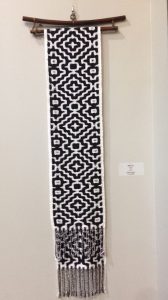
Instructor will provide:
- Drafts and handouts. Drafts will be sent out a month before the workshop or when it fills.
Materials needed
- Warped 8 shaft loom (More shafts are fine, but drafts provided by Deborah will be only for 8 shafts unless you tempt her with chocolate. You must know how to read a draft.)
- Warp and weft yarn of your choosing (You can put on enough warp for samples in class with additional length to weave a project, like a scarf of a shawl, after class. You may also want to cut off on Saturday to wash your samples Saturday night and then tie on again for Sunday. Either will require extra length.)
- The yarn you will choose from will be specified in the drafting instructions mailed to students at least one month prior to class.
- Your usual workshop tools like scissors, shuttles, bobbins, tape measure, and warp repair tools like weights
- It would be great if someone would offer to bring an electric bobbin winder!
I recommend the Bockens cotton rug warp from Lone Star Loom Room either white or natural. The 12/9 can be used at either a sett of 6 or 8, but some tapestry weavers prefer the 12/6. (See note above about the yarn which will be provided.)
Visible Mending / Boro

Christine Miller
Boro started in the Japanese culture as a way to keep garments alive by patching them with a visible mending technique. It was a practical necessity, but with the advent of the Slow Stitch movement, Boro has become an art form.
As we grapple with shrinking resources and the waste of Fast Fashion, embracing the practice of Boro encourages the stitcher to extend the life of their clothing by patching, mending, andcreating a unique piece of fiber art. No previous skills are required. We will learn and practice some basic embroidery stitches used in Boro.
Instructor will provide:
- A variety of scrap fabrics, and embroidery threads
- pattern for a simple bag that can be made using Boro principle
- sewing machine (and you are welcome to as well), but we will be focusing on Slow Stitching and will only use the machine if necessary
Materials needed
- You are encouraged to bring clothing to mend, and also bring a variety of scrap fabrics, and embroidery threads to donate for the use of the collective.
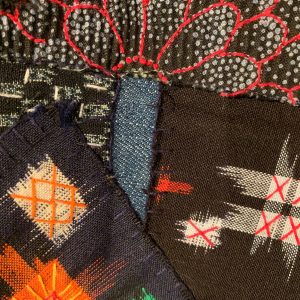
Because of the individual nature of each person’s projects, you may contact Christine in advance of Art Camp to brainstorm with her about your ideas. Christine will also bring a sewing machine (and you are welcome to as well), but we will be focusing on Slow Stitching and will only use the machine if necessary. You can reach Christine at .
Round Reed Bowl and Flat Twill Weave Bowl

Cricket Rose
Class Size: 10
Class Materials Fee: $45.00
Skill level: ability to weave anything
You will learn how to cut your own stakes without tangling bundles, learn how to soak/spray/towel off your weavers. Learn twining, lashing, twilling, shaping, and two kinds of rims.
Instructor will provide:
- Towels, buckets and and some basic tools
- Reed
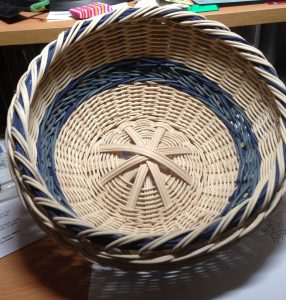
Independent Study – Daytime Class Option
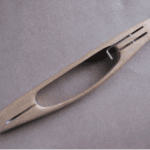
No Instructor
The concept is simple. Bring what you want to work on. Work or not work. No instructor. No limit except for facility restrictions on wet activities such as felting or dyeing.
And, if this is what you really want to do, there is a grassy place under a couple of trees with a garden hose for your use. Independent Study will take place in the Conference Hall meeting room. Lights, electricity, floor space, tables and chairs are available for your use. And, you will be closest to the morning and afternoon break area!
Evening Programs
* Saturday Evening *
TLC for Your Tools and Equipment

Al Hoering
You have spent both good money and your good time on spinning and weaving equipment. So, let’s talk about how we can keep the tools in shape and possibly rescue that bargain you couldn’t resist.
Materials Fee:
None
Class Equipment and Supply List:
Instructor will provide:
- A rusty reed and the appropriate abrasives to clean it
- Wheel lubricant and Danish oil.
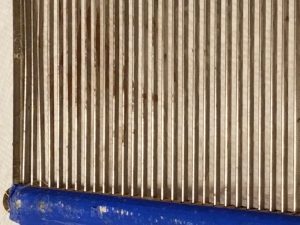
Beaded Bracelet

Peggy Friedriches
A beading project that any level of beader can master!!
Beautiful square Tila beads are made into a bracelet with seed bead embellishment. Several different colorways will be available for choosing
Materials Fee:
$12
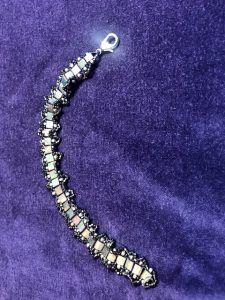
Evening Programs
* Sunday Evening *
Ribbon Birds and Friends
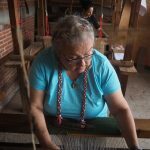
Rasa Silenas
My kid brother, man of many odd talents, showed me how to weave little birds from the Palm Sunday palms at church.
They make up nicely from ribbon too, and once you know how, they just take a few minutes. We will make birds that you can pin to your hat or attach to gift wraps or perch on a tree. Then show your kids how to make them and keep them busy for hours! We might also make fish or tiny baskets, depending on our mood
Materials Fee:
$2
Class Equipment and Supply List:
Bring scissors

Fabulous Finishes: Fasteners with Fashionable Flair

Cate Buchanan
Learn how to make easy decorative knots that can be used as closures on your garments or other creations. Instructions and supplies provided.
Materials Fee:
$5 per knot chosen
Class equipment and supply list:
Bring scissors, large eye tapestry needle, pins and regular needles
